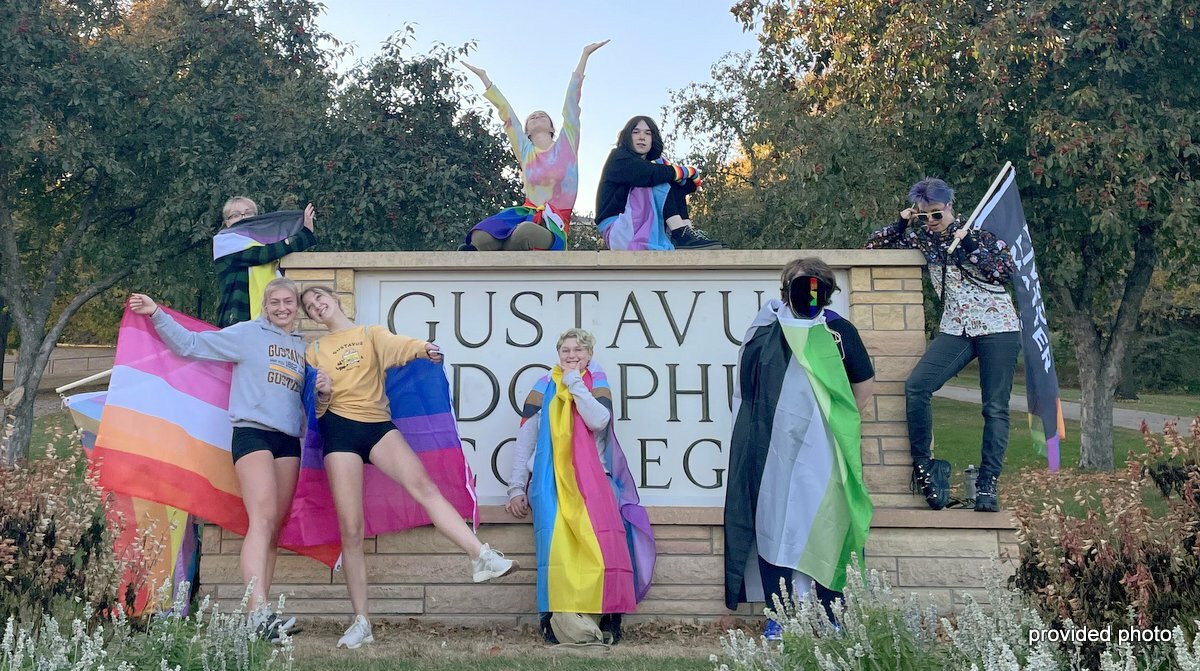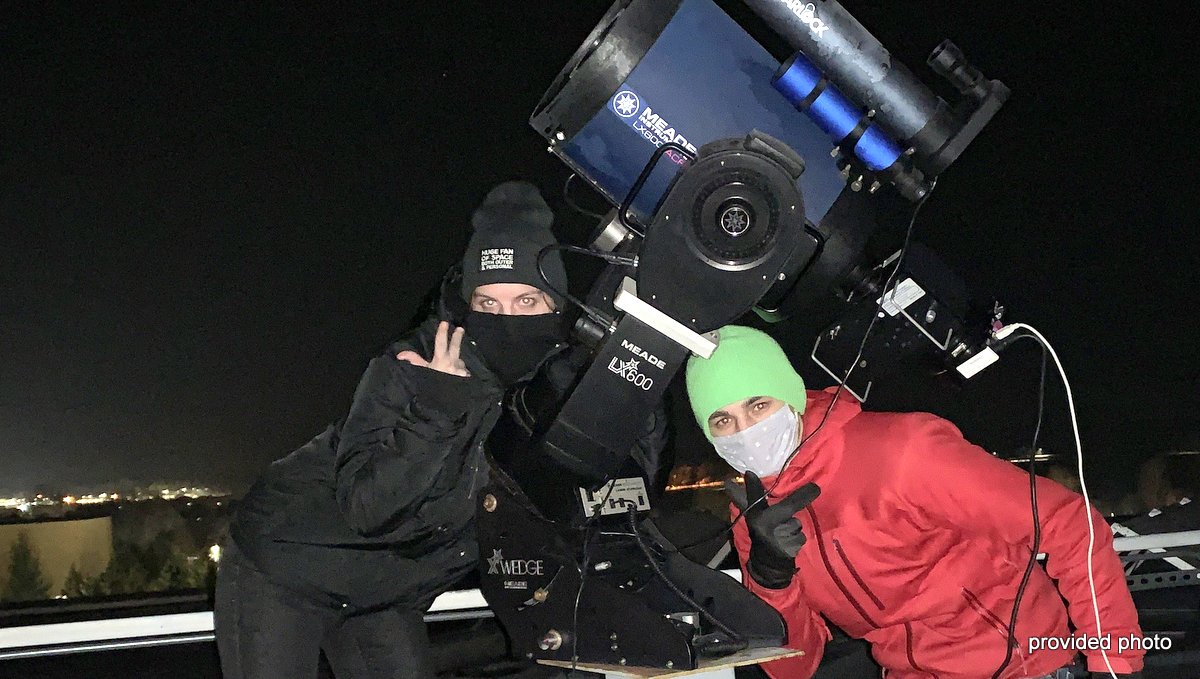Hoosac Graduate Making Waves in Physics Teaching FieldBy Sabrina Damms, iBerkshires Staff
12:06PM / Sunday, February 05, 2023 | |
 Donelan, far right, is also faculty adviser for the Gustavus Queers & Allies. Donelan, far right, is also faculty adviser for the Gustavus Queers & Allies. |

Darsa Donelan, left, with students at the Olin Observatory at Gustavus Adolphus College. They are making the 'physics gang sign' indicating the right-hand rule for finding the direction of crossing vectors.
ADAMS, Mass. — A Hoosac Valley High graduate has been recognized for their contributions in the field of physics education by the American Association of Physics Teachers.
Darsa Donelan received the Doc Brown Futures Award for "early-career members who demonstrate excellence in their contributions to AAPT and physics education and exhibit the potential to serve in an AAPT leadership role."
No, not that Doc Brown. This award is named for Case Western Reserve University professor Robert William Brown, an inaugural fellow of the AAPT who spent five decades in higher education, research and entrepreneurship.
Donelan is an award-winning assistant professor at Gustavus Adolphus College in Saint Peter, Minn., is a strong believer in mentorships, saying women role models have informed their way of teaching and made them into the person they are today.
"[Having multiple women teachers] was very, very exciting for me, because at the time I did not know I was non-binary, but so I was seeing myself as a woman in the field and it was great having that encouragement," Donelan said.
Donelan attempts to build relationships with their students and is dedicated to treating them like individuals rather than telling them that physics is the only thing that matters.
Their love for physics bloomed while attending Hoosac Valley and Massachusetts College of Liberal Arts thanks to the role models they had from the women instructors leading their physics courses.
One of the teachers Donelan fondly remembers for her dedication and caring for her students was Cheryl Ryan. Donelan worked at McDonalds while a student and would often accept co-workers' requests to stay late.
They soon became overworked to the point they would show up to school tired. Ryan called up the fast-food eatery demanding that they stop asking Donelan to stay late.
"I worked there for seven years through high school and undergrad, which was a good experience," Donelan said.
"I really liked my co-workers at that job, but I think it did help them recognize that 'maybe we shouldn't always ask the person who just says yes, because they may have other things that's going on.'"
This empathy that Ryan displayed for her students stuck with Donelan and contributed to their teaching approach.
It wasn't until graduate school that Donelan was confronted with an adviser at the University of Florida who attempted to steer them away from their goals. The adviser encourage Donelan to leave graduate school with a master's degree instead of a PhD because he could not see them succeeding in the physics field.
"Then I got into grad school, that's when I first experienced some misogyny within the field …There are some rather untoward things that he had said to me in emails. Luckily, I found a new adviser and was able to get through grad school and now make a career where I'm thriving and doing great," Donelan said.
"There's still been things that have made it tough, but I guess just being able to feel like I've made it. I had instances in the past where I was told, 'Oh, you can't do this' but I think also representing queer physicists as a nonbinary person is also very important to me."
Despite these remarks Donelan continued down their path obtaining a new adviser and went on to serve as a role model for aspiring female and LGBTQIA-plus physicists. And they have gone on to receive multiple awards throughout their academic and professional career.
"[The teachers and professors] I think I learned the most from and are the most memorable are the ones that treated me like a person and cared about my well-being both physically and mentally," Donelan said.
"And because I knew they cared and that valued my well-being it made it easier to learn, rather than somebody who was like, 'nope, the only thing that's important right now is physics.' And to keep working, working, working. In those situations, you feel like you're never going to be good enough."
These relationships Donelan builds with their students not only influences the students but also theirself.
Donelan recollected an example of this when the students supported their decision to cut their hair short despite Donelan's initial hesitation because they were afraid they would not be a good role model for women.
The students encouraged them and helped Donelan shave their hair that day, they said.
Donelan does not shy away from demonstrating who they are, including participating in the college's annual drag show.
Throughout high school, Donelan always had an inkling that they were nonbinary. It wasn't until college school that they started to explore their sense of self and cemented their gender identity at an APPT conference.
"I know something that was really amazing for me was, I think it was probably six years ago, I was at an APPT conference, and they had pronoun stickers. I remember seeing that and started getting tears in my eyes," Donelan said.
"It was really powerful to be like, 'Yeah, I'm going to put this on and I'm going to be who I am' because at the time, I really wasn't telling people. But then I just put the sticker on my badge and I was like, 'Yeah, that's me.' Because of that, I think more people have been comfortable and saying who they authentically are."
Donelan has participated in AAPT's collaboration with the National Aeronautics and Space Administration to produce space science themed educational supplements which led to the development of tutorials on habitable zones, exoplanet atmospheres, and stellar spectra.
Their eclectic background is what made them an integral part of the AAPT/NASA team, according to AAPT's press release.
Donelan first earned an associate's degree in art from Berkshire Community College and believes that time gives them a liberal arts perspective on science and helps maintain their anxiety.
"The arts definitely help because teaching is an art form. It's a type of performance," they said.
In undergrad and high school they had severe anxiety but viewing teaching as a type of role or performance helps them look at it with a different perspective, Donelan said.
But they did miss physics and ended up painting equations underneath some of their work. This yearning is what led Donelan to study physics and mathematics at MCLA.
Donelan hopes to continue to support their students, helping them make real impacts to the physics community through their work.
| 
